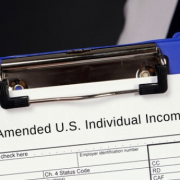Noticed Extra Money In Your Paycheck? The Good And The Bad Of The Payroll Tax Cut
 To help Americans who are financially struggling during the pandemic, President Trump suspended the Social Security payroll taxes usually taken out of our paychecks from September 1 through the end of the year.
To help Americans who are financially struggling during the pandemic, President Trump suspended the Social Security payroll taxes usually taken out of our paychecks from September 1 through the end of the year.
This “payroll tax holiday” as it’s referred to is limited to those who make less than $4,000 every two weeks which amounts to less than $104,000 per year.
Your employer could have opted out of this tax holiday but if they didn’t, you’re probably seeing more money in your paycheck. By the end of the year those who work 40 hours-per-week will see about $550 more if they make $10 per-hour, $825 more if they make $15 per-hour and $1,375 if they make $25 per-hour.
But as with most things in life, there’s a catch. It’s essentially a loan.
“That’s not a forgiven tax. It’s just a tax deferral,” explained Joe LaTour, the Founder and President of LaTour Advisory Group. “So at some point you’re going to pay the piper.”
That point will come over the first four months of 2021 when the holiday ends and you’ll be paying twice the payroll tax unless Congress forgives the debt, which seems unlikely.
“So in January-through-April people are going to see much lower paychecks than what they’re used to because they’ll be paying not only their regular employment taxes but they’ll also be paying back the tax that should have been withheld during this time,” explained Dr. Tiffany Cossey, an Associate Professor of Accounting at Drury University.
There’s also a potential mess looming in that the IRS sent out new W-4 forms. Those forms are where you fill out information that determines how much is withheld from your paycheck and it’s being done by the IRS with the goal of not having to hand out so many high refunds come tax time in April.
“So the mess it’s going to create is not only are they (employees) going to see lower paychecks in the spring but they may not even be able to catch up on things because that income tax refund is going to be lower than it has been in the past,” Dr. Cossey said.
So what should you do? Well, if you’re living paycheck-to-paycheck and need the money to pay bills and survive, that’s why the extra money was made available. But if it’s extra cash for you, just remember it’s extra cash the government wants back unless Congress changes the stipulation. So most financial advisors are giving the same advice.
“Just take that extra money you notice in your paycheck and put it back in your savings account and don’t touch it,” Dr. Cossey suggested.
“I would say lay it back because you’re going to have to pay it back unless they, with a future ruling, forgive it,” LaTour agreed.
However, if you’ve got plenty of money to cover the future doubled-up taxes and potential smaller income tax refunds?
“Then sticking it back in your retirement would be good for you in the long run and it could have tax benefits,” Dr. Cossey pointed out. “It’s so short-term that you wouldn’t want to stick that money in a CD being offered by a bank because those go for a term of years. I think the shortest CD I’ve ever seen is six months and that’s too short of a term if the people are going to need to withdraw their money to cover the shortage. So really for something that short term, a savings account is probably the best place to put it if they’re going to need access to that money again.”
Source: KY3 News

